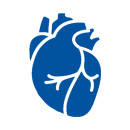
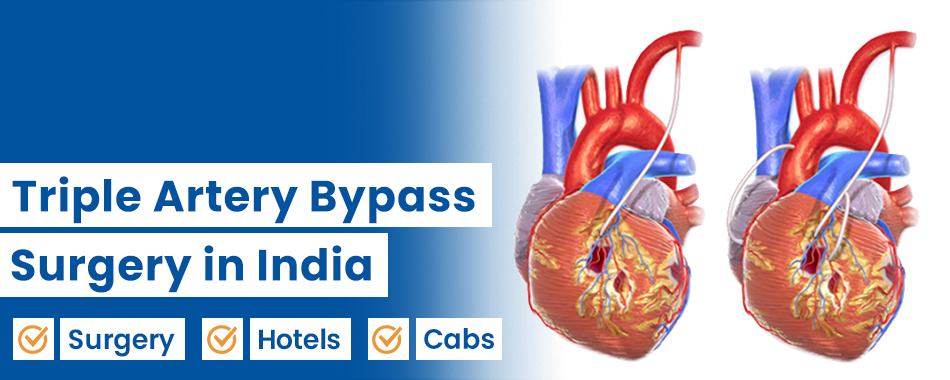
Triple artery bypass surgery is one of the most common heart-related procedures that are performed in the world. It is used to redirect blood towards the three blocked coronary arteries in your heart. Most heart conditions are caused by several blocked arteries. Therefore, in such cases, triple artery bypass surgery, also known as a triple bypass operation, becomes necessary to restore normal blood flow again and relieve the symptoms.
India has emerged as a prominent centre for patients who require such surgical cardiac care because its health services are so affordable. It also has excellent surgery experts and appropriate medical facilities. This page covers everything about the triple artery bypass surgery in India, including the uses, the procedure, recovery, best triple artery bypass hospitals and the benefits of triple bypass operation in India.
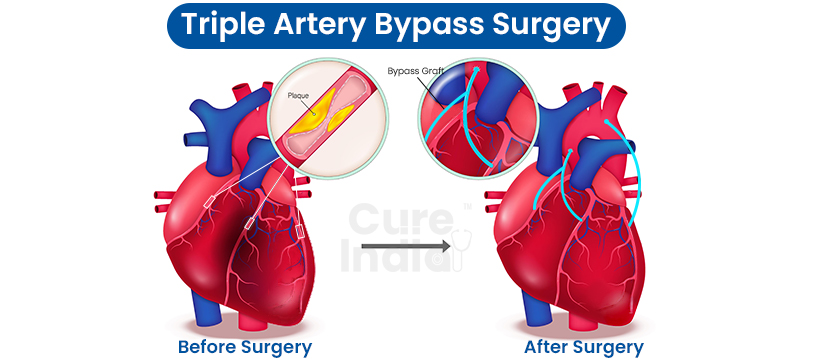
A triple bypass is a surgery in which doctors perform the bypass on the patient if there are severe blockages of three coronary arteries. To rectify this, surgeons will create new blood paths by performing the triple bypass. Eventually, it seeks to allow the bloodstream into the heart muscle, which confines pain. Besides, it seeks to allow the bloodstream into the heart muscle, which confines pain and averts a heart attack.
Several indications that create a demand for triple coronary bypass surgery include:
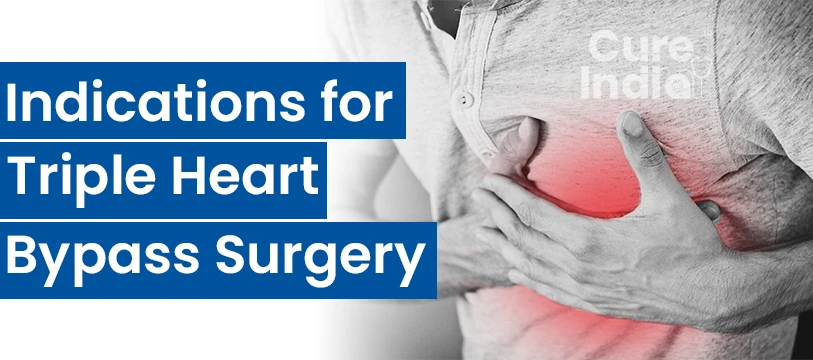
The decision to have a triple heart bypass operation should be based on visible symptoms that reflect significant involvement of the coronary arteries. Some of them include:
There exist two common ways of performing triple artery bypass surgery in India:
In bypass surgeries, surgeons often carry out an open heart surgery through large chest cuts to reach the heart. The most notable ones include:
Doctors could even administer these methods slightly invasively in some cases. These techniques include fewer incisions and even robotic assistance. The benefits include:
Yet, this is not true for every patient. The method of bypass may vary from one patient to another, depending upon the percentage of the blockage and the surgeon's preference.
Triple artery bypass surgery is a complex cardiac procedure that is performed to restore blood flow in patients with severe coronary artery disease affecting three major arteries. This surgery involves grafting healthy blood vessels to bypass blocked arteries and improve heart function. India boasts some of the most experienced cardiac surgeons known for their expertise in coronary artery bypass grafting with high success rates and advanced surgical facilities. Some of the best surgeons for triple artery bypass surgery in India include:
Dr. T. S. Kler is one of India’s leading cardiothoracic surgeons with over four decades of experience in cardiac surgery. He has performed over 35,000 successful bypass procedures, including complex triple artery bypass operations. Known for his work in cardiac electrophysiology and advanced surgical techniques, Dr. Kler is one of the best in his field.
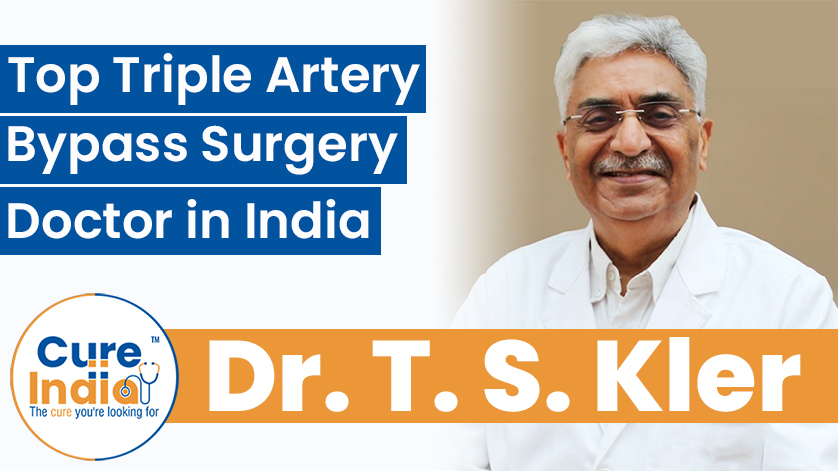
Dr. Ashok Seth is a globally acclaimed cardiologist and cardiac surgeon with 40 years of experience in coronary artery disease management and triple artery bypass surgery. He has contributed extensively to advancements in interventional cardiology and complex bypass grafting procedures. Till date, he has performed more than 60,000 cardiac procedures.
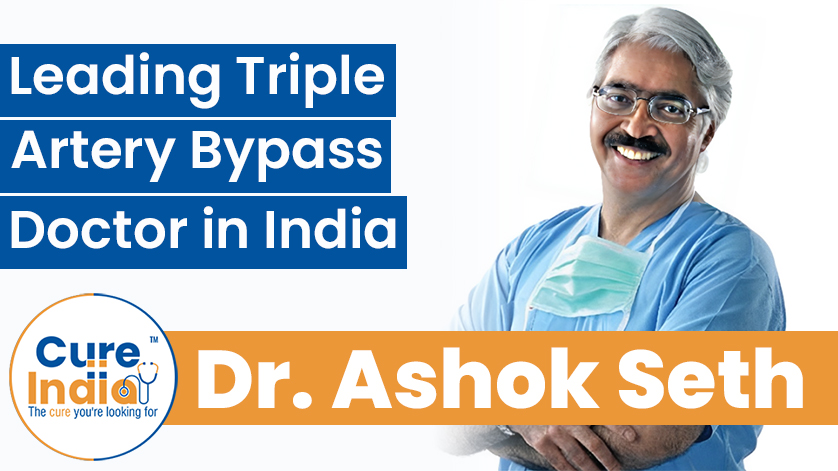
Dr. Naresh Trehan is one of India’s best cardiac surgeons, known for performing thousands of successful bypass surgeries, including triple and quadruple artery bypass operations. With more than 53 years of experience, he specialises in performing minimally invasive and robotic cardiac procedures.
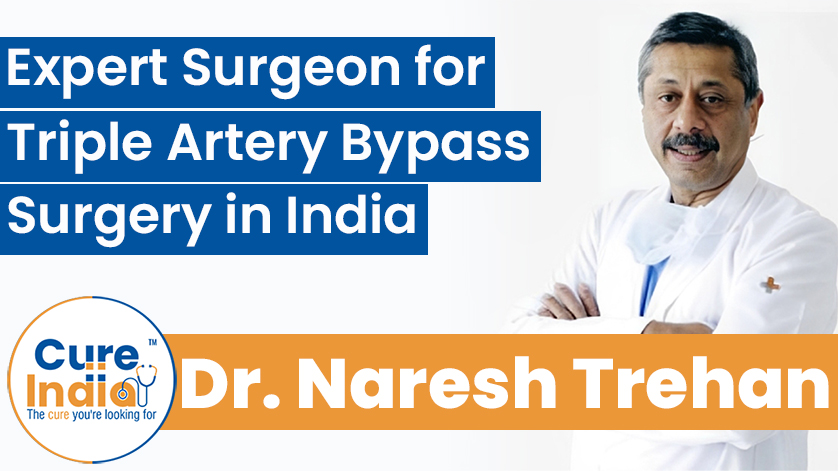
Dr. Ramji Mehrotra is a top-rated cardiothoracic and vascular surgeon with extensive expertise in coronary artery bypass grafting, especially triple artery bypass procedures. He is known for his advanced surgical techniques, high success rates, and patient-centric cardiac care.
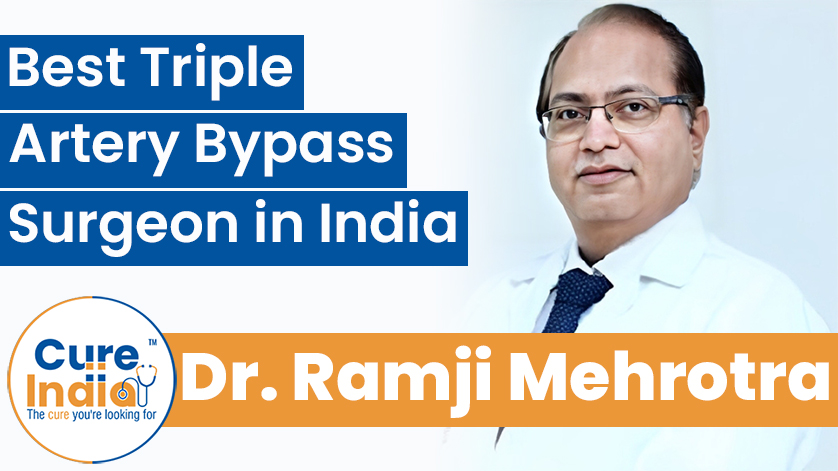
Doctors only decide on the triple heart bypass operation case by case. Some important aspects taken into consideration include:
A patient with triple coronary bypass would often necessitate the following precautionary measures before the surgery:
When you have the right knowledge of the surgery, it can help alleviate fears regarding it. Here is a step-by-step description of a triple bypass operation in India:
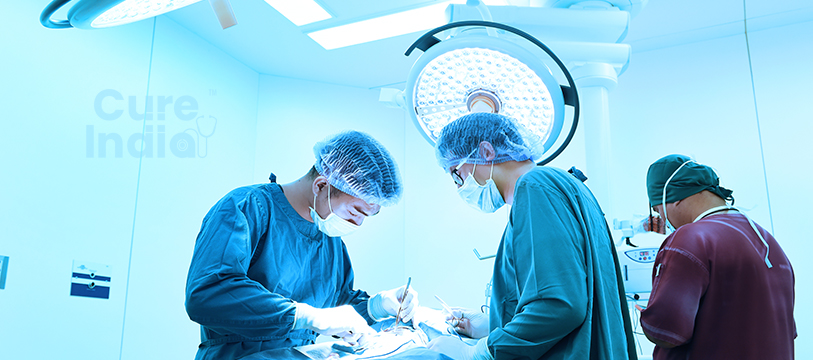
■ Administration of Anaesthesia: General anaesthesia is provided to the patient in a manner that no sort of pain goes through the patient during the surgical procedure.
■ Incision: An incision of the median incision may start at the middle of the chest but go across one side for the open operation. Surgeons make several minor cuts in a less invasive procedure.
■ Harvesting the Grafts: Surgeons remove veins or arteries elsewhere in the body to make the bypass.
■ Position of the Graft: These grafts are placed on both sides of the region with adequate blood flow towards the heart muscle of the coronary arteries.
■ Closure of the Incisions: After graft placement, the chest is closed. The medical team moves the patient to the recovery room following the surgery.
The outcome of recovery from triple artery bypass depends on the kind of surgery, the health of the patient before performing the surgery, and the extent of care after the operation.
A patient, after an experience with classical open-heart surgery, will have a recovery procedure that includes:
Generally, recoveries of those who emerge as beneficiaries of minimally invasive surgery happen much sooner.
Triple heart bypass recovery is indeed a major life-scaling change in life, as it maintains the health of the heart and prevents future complications. Some lifestyle changes include:
First of all, a diet that has a low amount of saturated fats, cholesterol, and sodium; a diet in heart rehabilitation includes fruits, vegetables, whole grains, and lean proteins. This keeps the heart healthy.
In addition, a step-by-step increase in the level of physical activity that a doctor prescribes would also provide improvement in cardiovascular fitness, aid in weight loss, and help in reducing stress.
Also, patients usually go through medication for blood pressure and cholesterol. Completing the cycles as set by the doctor will be very important to ensure the complete success of the process.
Ultimately, quitting smoking has a highly beneficial impact on the heart and reduces the chances of future heart disease.
Triple artery bypass surgery in India is a cost-effective alternative to the same procedure in countries like the US, UK, or Australia. Through CureIndia, the surgery costs between $4,500 and $7,000, depending on the hospital, the surgeon’s expertise, and the patient’s medical condition. This major cardiac procedure is carried out by experienced cardiothoracic surgeons in hospitals equipped with advanced surgical and postoperative care facilities. The cost of triple artery bypass surgery in India along with the procedure cost is mentioned below:
| Treatment Name | Cost in India | Stay in India |
|---|---|---|
| Triple Artery Bypass Surgery in India | $8,000 | 10 - 15 Days |
India has turned out to be the most favored destination for many patients around the globe who are looking for economical and quality cardiac care. For this reason and many more, here's a list of the most compelling reasons:
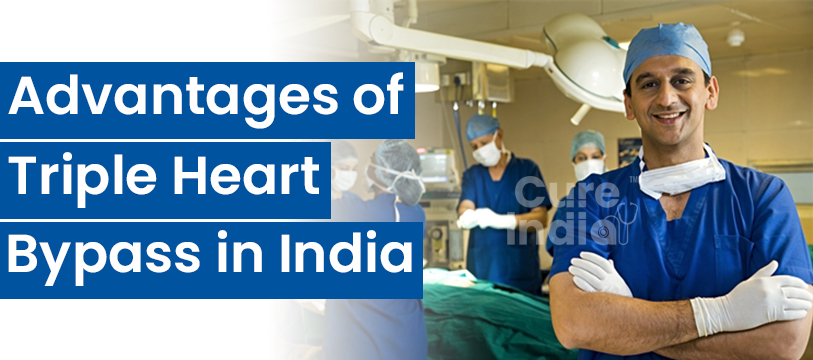
Compared to the charges in Western Countries, triple artery bypass surgery in India would fetch a significant economic saving. Indian patients could save up to 60-80% of their treatment charges without any compromise on the quality of care.
India also has many highly experienced cardiothoracic surgeons who have had their medical education from some of the highly reputed institutions and are abreast with conducting complex surgeries like triple coronary bypass.
Here also, several good hospitals can be found across different regions in India, which, due to their top-of-the-line technology and infrastructure, help well in maintaining healthy patient outcomes.
While most other countries force patients to wait for an extended duration before conducting surgery, India generally grants immediate or prompt access to the operations.
From pre-operative assessments to post-operative follow-ups, Indian healthcare providers afford a more holistic approach to patient care.
A triple artery bypass is lifesaving for severe coronary artery disease. Surgeons re-establish blood flow and reduce symptoms. Patients can choose any advanced medical facility. With improved healthcare, several people around the world visit countries like India to seek medical attention. Such medical facilities provide experienced surgeons and inexpensive treatments. So, as soon as a patient requires a triple bypass, a doctor should be consulted. Patients can discuss all possible alternatives, reduce their fears, and begin recovery with confidence.
